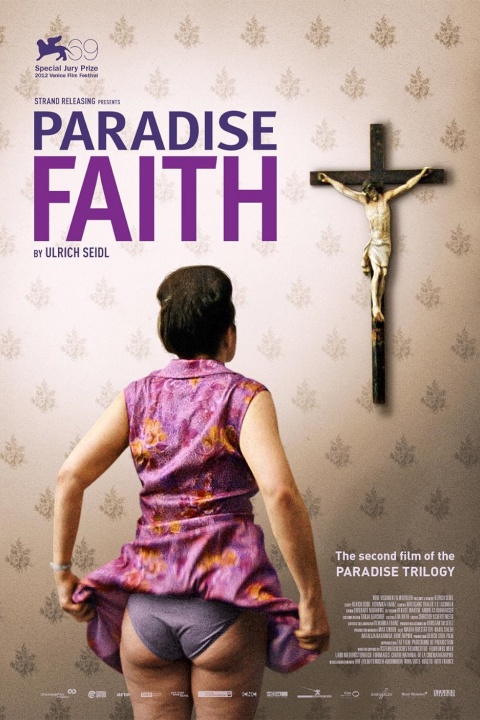This could be Seidl’s most provocative work about the moral slippage of religious fanatics, as the faith of an extremely devoted Catholic Austrian woman is tested by the unexpected return of her handicapped Muslim husband.

Review #2,755
Dir. Ulrich Seidl
2012 | Austria, Germany | Drama | 109 min | 1.85:1 | German & Arabic
Banned in Singapore – exceeds R21 rating guidelines for unsimulated sex and religious themes
Cast: Maria Hofstätter, Nabil Saleh, Natalya Baranova
Plot: For Anna Maria, paradise lies with Jesus, and she devotes her time to door-to-door missionary work. One day, after years of absence, her husband, an Egyptian Muslim confined to a wheelchair, comes home.
Awards: Won Special Jury Prize & Nom. for Golden Lion (Venice)
International Sales: Coproduction Office
Accessibility Index
Subject Matter: Mature – Religious Fanaticism; Morality; Blasphemy
Narrative Style: Slightly Complex
Pace: Slightly Slow
Audience Type: General Arthouse
Viewed: MUBI
Spoilers: No
This second part of Ulrich Seidl’s ‘Paradise’ trilogy was banned in Singapore back in the early 2010s when the German Film Festival had the trilogy curated as part of its programme. The reasons are obvious. There is a scene of an unsimulated orgy in a park where nothing is left to the imagination.
It’s a shocking image not just for audiences (well, except Seidl’s fans who have come to expect nothing less than full-on provocation from the director) but also for Paradise: Faith‘s protagonist, Anna Maria, an Austrian woman who does door-to-door missionary work during her days off.
She is an extremely devoted Catholic, though one might describe her as a religious fanatic, shoving the Mother of God into the faces of random strangers in apartment blocks, and inflicting violent punishment on herself on a daily basis.
One day, her estranged husband, an Egyptian Muslim who is handicapped, unexpectedly turns up in a wheelchair, and this is where Seidl’s provocation enters a more controversial level, something that Singapore’s censorship board would never have accepted.
“The Mother of God is here to see you.”
This includes sacrilegious scenes where religious objects like the cross are spat on, thrown to the ground, and in one instance, used as a tool for sexual pleasure.
While not as immediately compelling as Paradise: Love (2012), Faith takes pride in being defiantly offensive, which would thrill arthouse viewers looking for films that dare to challenge the status quo.
What Seidl’s work does quite effectively is to bring to the fore the moral slippage inherent—and apparent—in Anna Maria’s sometimes confounding behaviour, such as the appalling treatment of her husband.
Religion can incapacitate and corrupt if we let it control our entire lives. Moderation is key, even if blind faith tells us otherwise.
Grade: B+
Trailer:












[…] conceptual antecedent to Paradise: Faith (2012), the controversial second film of Ulrich Seidl’s ‘Paradise’ trilogy, Jesus, You Know […]
LikeLike